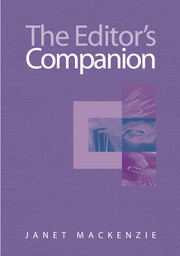Book contents
- Frontmatter
- Contents
- List of illustrations
- Preface
- 1 The editor in context
- 2 The publishing process
- 3 Management and liaison
- 4 Substance and structure
- 5 Language
- 6 Illustrations and tables
- 7 Completeness and consistency
- 8 Proofs
- 9 Editing methods
- 10 Working with documents and files
- 11 Freelance editing
- Appendix: Australian Standards for Editing Practice
- Notes
- Select bibliography
- Index
- Frontmatter
- Contents
- List of illustrations
- Preface
- 1 The editor in context
- 2 The publishing process
- 3 Management and liaison
- 4 Substance and structure
- 5 Language
- 6 Illustrations and tables
- 7 Completeness and consistency
- 8 Proofs
- 9 Editing methods
- 10 Working with documents and files
- 11 Freelance editing
- Appendix: Australian Standards for Editing Practice
- Notes
- Select bibliography
- Index
Summary
The freelance lifestyle offers both the pleasures and the irritations of working at home. As a no-collar worker you wear what you like, you work when you like, you control your working environment and equipment, you don't have to commute, you avoid meetings and office politics. The disadvantages are equally obvious: you need to obtain enough work to survive, your income is uncertain, it is difficult to maintain a smooth schedule, there are no workmates down the corridor, and you need to separate your work from the demands of the household.
This chapter surveys the concerns of freelance editors. Further guidance can be found in books on freelance writing and journalism, self-employment, working from home, and small business management: look in business bookshops or under Dewey 650s in libraries. It is advisable to obtain specific professional advice on matters of finance, tax and law.
I think I'll go freelance
Some experienced editors choose freelancing as a career option; others are forced into it by retrenchment or dabble for extra income in retirement. Not everyone is suited to self-employment: being good at editing is not enough. Do not think of becoming a freelance editor unless you have the personal qualities that make editors such paragons, as listed in Chapter 1, and competence in the knowledge listed in Australian Standards for Editing Practice (see Appendix).
- Type
- Chapter
- Information
- The Editor's Companion , pp. 171 - 188Publisher: Cambridge University PressPrint publication year: 2004



